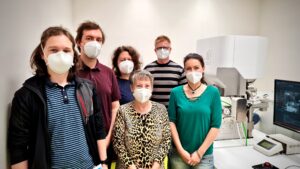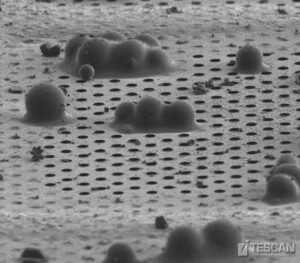Until recently, observing viruses or proteins in detail was the dream of scientists around the world. The modern method of cryo-electron microscopy shows cell structures in almost atomic resolution and allows a better understanding of the chemical bonds and the functioning of living organisms. Moving the possibilities of this research to an even higher level is the goal of the cooperation between the Institute of Molecular Genetics (IMG) of the Academy of Sciences of the Czech Republic and leading technological companies, led by the Brno manufacturer of electron microscopes TESCAN.
The institute uses a new electron microscope
Since the beginning of 2021, scientists from the IMG have been able to use the new TESCAN AMBER cryo-electron microscope in their laboratories, which was lent to them by the Brno technology holding TESCAN as part of a scientific partnership. The device is specially adapted for the observation of biological samples at temperatures around −160 ° C, which makes it possible to preserve the internal structures of cells. Laboratory equipment, lent to the institute by the German manufacturer LEICA Microsystems, handles the preparation and freezing of slides. The mutual cooperation did not end with the provision of equipment, however, and IMG will work with both companies to further deepen their scientific research cooperation
New technologies will make it possible to better understand cell biology

Team of the Institute of Molecular Genetics AS CR in the laboratory with the TESCAN electron microscope.
“We will focus on deepening knowledge about the structures of the cell nucleus that ensure the regulation of gene transcription into RNA. We have found that in addition to proteins and nucleic acids, some lipids also play a key role in this vital and extremely complicated process. The best tool for the study of lipid structures is the frost methods, which will allow their characterization in a fully hydrated state, closest to the native one. The aim of the cooperation is to connect the developers of top laboratory devices with the application of their solutions directly in practice,” says Pavel Hozák, Head of the Cell Biology Department and Director of the Research Infrastructure of Czech-BioImaging.
The equipment for cryo-transmission electron microscopy, which is used in the project at the IMG electron microscopy service facility, was acquired thanks to the support of the Ministry of Education for the Czech-BioImaging research infrastructure and the emerging new procedures will be accessible to all researchers and companies.
New knowledge will be available for other scientists

Yeast cells on the surface of the TEM grid using cryo-electron microscopy.
Cooperation between scientific institutions and commercial companies is a recent trend. “I am glad that, thanks to this partnership, we have the opportunity to influence the development of top scientific instruments so that they correspond as closely as possible to practical use,” says Petr Dráber, Director of IMG AS CR. “Scientific successes are usually not due to individuals, but to entire expert teams that can work together effectively and share experiences.”
Acquired knowledge from the collaborative project will be shared with the entire life sciences community. Participants are expected to organize scientific workshops, publish in professional journals, share application sheets and cooperate intensively with the wider scientific community.
“User feedback is very important for the development of our electron microscopes and we check it regularly. However, this cooperation is exceptional in that we can be a direct part of the team of Professor Pavel Hozák, who is a world leader in his field,” said Ondřej Šulák, Director of Product Marketing for the Life Sciences segment, on behalf of TESCAN. “Thanks to the project, TESCAN wants to optimize existing sample preparation procedures and develop new techniques, which it will also test directly in practice. The partnership is concluded by the end of 2021 with the likelihood of extension.”
About the Institute of Molecular Genetics AS CR
Institute of Molecular Genetics AS CR, v. in. i., (IMG) is a public scientific institution, part of the Academy of Sciences of the Czech Republic, conducting research in the field of molecular, structural and cell biology, immunology, functional genomics and bioinformatics. The main priority of IMG is basic research activities, the output of which are mainly scientific publications in prestigious international journals. Equally important is applied research and transfer of results into practice. An important part of IMG are service groups and modern national research infrastructures (Czech-BioImaging, Czech Center for Phenogenomics, CZ-OPENSCREEN and ELIXIR CZ), which ensure optimal use of sophisticated instruments and provide a basis for developing new tools and methods used by the scientific community not only in within IMG, but also by other research institutes or laboratories in the Czech Republic and abroad.
About TESCAN
TESCAN enables its customers to research and analyze in nano resolution. Its solutions are used in geosciences, materials sciences, the semiconductor industry and life sciences. The company has a 30-year history of developing innovative electron microscopes, microtomographs and related software solutions for users in research and industry. Through its efforts, TESCAN has gained a leading position in micro- and nanotechnologies.
TESCAN ORSAY HOLDING was founded in 2013 as a result of long-term expansion and the establishment of subsidiaries around the world, including the French company OR-SAY PHYSICS, a world leader in ion and electron beam technology. TESCAN ORSAY HOLDING maintains its headquarters, production, research and development in Brno. Each TESCAN microscope is professionally manufactured in Brno and delivered to customers all over the world.
Further information can be found at: www.tescan.cz.
About Czech-BioImaging
Czech-BioImaging’s National Infrastructure for Biological and Medical Imaging provides open access to a wide range of imaging technologies and expertise to obtain completely new scientific data. At the same time, it increases the qualifications of researchers and students in this field through educational programs. The Czech-BioImaging research infrastructure responds to imaging needs at various levels – from imaging of organisms, tissues and cells to imaging of cell organelles, transport, biomolecules and their interactions in health and disease. The Czech-BioImaging research infrastructure is a member of the pan-European research infrastructure Euro-BioImaging. Czech-BioImaging activities are supported by the Ministry of Education (LM 2018129, No. CZ.02.1.01 / 0.0 / 0.0 / 16_013 / 0001775 and No. CZ.02.1.01 / 0.0 / 0.0 / 18_046 / 0016045).

